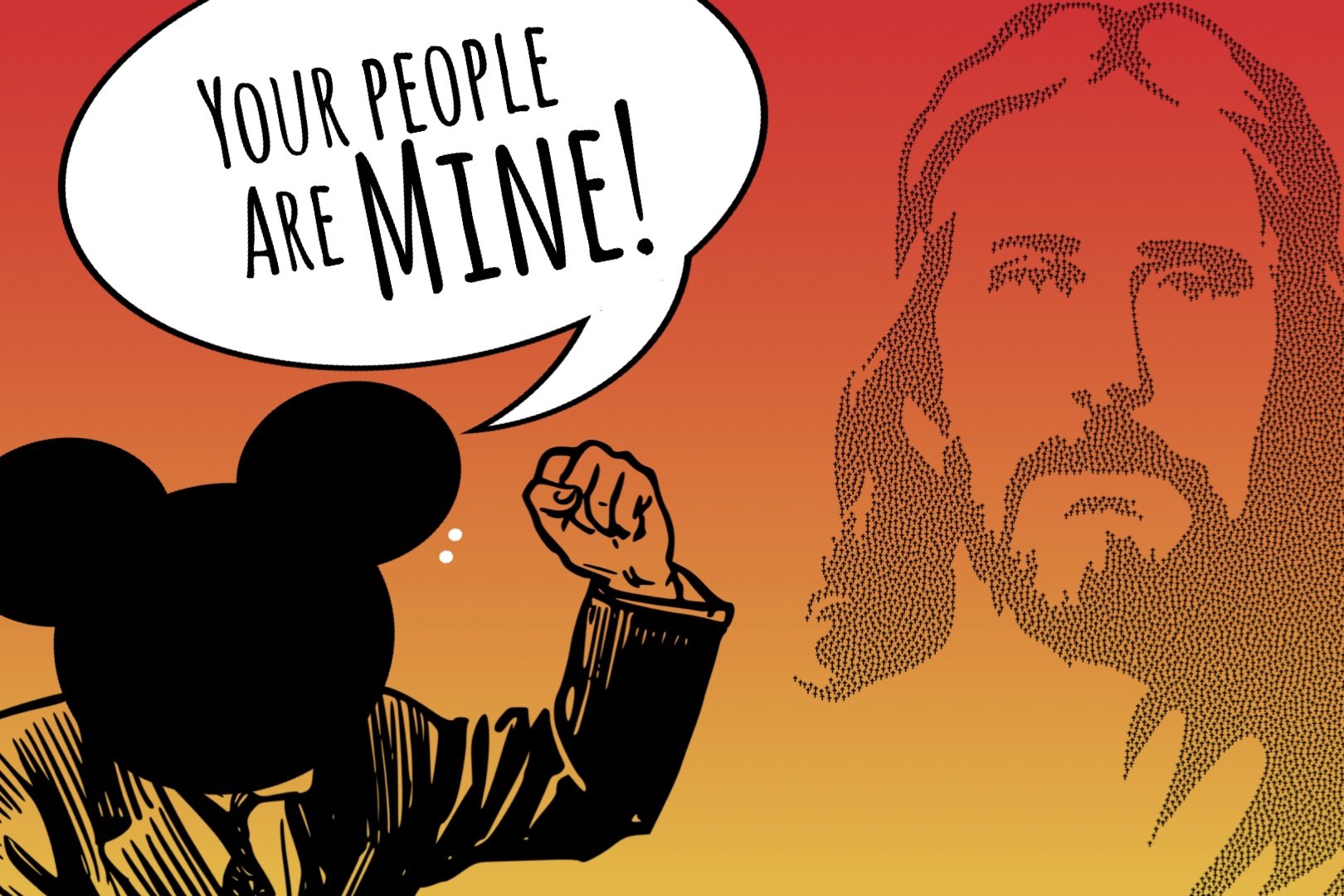Dear Christian, Can You Live Without Disney?
If Jesus tells you to give up Disney, could you do it? Here’s why He may be telling you to do just that.
Background: The Bill
You may have heard about the new Florida bill that has been referred to by its opponents as the “Don’t Say Gay” bill. The bill does a number of things, one of which is to prohibit public schools from teaching children under fourth grade about sexual orientation and gender identity. Essentially, it stops teachers from indoctrinating young children into the LGBTQ+ worldview.
Opponents of the bill, I would argue, want to do just that. They want to confuse and sexualize children so they grow up accepting as normal and good what God says is dishonorable and damnable, and rejecting the God-given categories of male and female, man and woman.
Disney’s Response & Agenda
After the bill was signed into law on Monday, the Walt Disney Company issued a statement voicing its opposition, thereby officially revealing its support for the sexual indoctrination and psychological abuse of young children. In part, the statement declares, “Our goal as a company is for this law to be repealed by the legislature or struck down in the courts, and we remain committed to supporting the national and state organizations working to achieve that.”
Then, it was reported on Tuesday that there was “an all-hands meeting” in which general entertainment president Karey Burke—herself a “mother of two queer children”—pledged to include more LGBTQIA characters in Disney’s entertainment, especially leading characters.
In fact, Disney has a campaign called “Reimagine Tomorrow,” for which promotional materials state, “By 2022, 50% of regular and recurring characters across Disney General Entertainment scripted content will come from underrepresented groups”—which you can bet does not just mean so-called racial minorities, but also so-called sexual and gender minorities.
In the same aforementioned meeting, television animation executive producer Latoya Raveneau boasted, “Our leadership over there has been so welcoming to my not-so-secret gay agenda. Wherever I could I was adding queerness. No one would stop me and no one was trying to stop me.”
Yet another speaker in the meeting, diversity and inclusion chief Vivian Ware, said Disney crew members have been directed to address theme park visitors as “dreamers” and “friends” instead of “ladies and gentleman, boys and girls.”
So, Disney is now out and proud about being all-in on the LGBTQ+ agenda, even to include fighting for young children to be taught sexual confusion in school. This is no surprise to anyone who’s been half-aware of Disney culture for the past 30 years or so, but it’s now plain for anyone else to see.
The Christian Response
So then, dear Christian, knowing that Disney is planning to further flood its entertainment with this worldview that is antithetical to God’s Word, will you continue to fund, endorse, and partake of that entertainment? Will you continue to let your children partake of it and be influenced by it? I fear that the American church has gotten so used to being inundated with this social messaging in entertainment, and has become so attached to that entertainment, that most will not have the stomach or the backbone to simply abstain.
True, if we boycotted or abstained from every company that supported ungodliness, we would scarcely be able to live and engage in the world. But a company like Disney is different because its service is entertainment—and that entertainment is entirely nonessential. You could live and engage in the world without ever consuming Disney entertainment, and it would not inconvenience you in the slightest. In fact, you have to go out of your way to give Disney your money—you have to buy the ticket, you have to pay for the subscription, you have to order the product. None of these things are necessary or even helpful for you to live your life; they are superfluous.
But if you’re in the habit of doing those things, they don’t feel superfluous. The idea of stopping, of canceling the subscription, of not going to the park, of not buying the products, seems hard. Why? Because these things have a way of working themselves into our hearts. Our entertainment has a way of garnering our love and affection. You come to adore the little Mickey Mouse tchotchkes, you come to love the Disney park experience, you come to care about the characters of “The Mandalorian” — and it’s hard to imagine just giving it up, just not going there anymore, or just not finishing the series.
But if that’s your case, I humbly ask you to consider this: what does that say about how invested you are in something that has no actual benefit to your life, and which is explicitly, admittedly opposed to the will of God? Now maybe someone will argue that the diversion this entertainment provides is a benefit to one’s life, but if that’s true, can’t such diversion be found just as well from some source of entertainment that does not hate God’s values and want to corrupt your children?
Maybe you’re inclined to shrug all this off as no big deal: “It’s just entertainment; it’s a small thing, it’s insignificant, it doesn’t matter.” Well if that’s true, then it shouldn’t matter to give it up, should it? But if you struggle to give it up, it shows that it’s not a small thing to you after all, doesn’t it?
History Lesson: A Failed Disney Boycott
And here’s the sad part. Even if some people are swayed by all of this to stop supporting Disney, in most cases, their resolve probably won’t last.
In 1996, a number of Christian organizations started a boycott of Disney—including the American Family Association, Focus on the Family, and the Southern Baptist Convention. The boycott was, in large part, a response to Disney’s gay agenda. That’s right: it was basically the same issue, over a quarter of a century ago. Then, eight years later, in 2005, after the boycott had had no effect on Disney’s policies, those organizations just dropped it, consoling themselves by saying things like, “the action had ‘communicated effectively our displeasure.’”
The Southern Baptist Convention included in its reasoning that in order for a boycott to work, “it must be specifically targeted and of limited duration.” But that didn’t take into account two things: first, if your boycott didn’t have the desired effect, then that means the company still doesn’t deserve your money; and second, if an entertainment company continues to have a harmful agenda, then consuming that company’s entertainment continues to be harmful. It shouldn’t just be about effecting change on the company, but also protecting ourselves and our children from harmful influence. And if anyone thinks that’s not a legitimate concern, then please explain how entertainment does not have a major influence on the values of the audience, especially over time. Of course it does.
What the Bible Says
First John 2:15 says, “Do not love the world or the things in the world. If anyone loves the world, the love of the Father is not in him.” So, if you love some source of entertainment… if you would hesitate to give it up if Jesus told you to… if you have a hard time imagining your life without it… then you’re loving something in the world, which you’re commanded not to do, and which reveals an absence of the love of the Father.
Second Peter 2:19 says, “whatever overcomes a person, to that he is enslaved.” If you can’t stop yourself from consuming some source of entertainment, then you are enslaved to it. It’s your master. And you know what Jesus said about masters: “No one can serve two masters, for either he will hate the one and love the other, or he will be devoted to the one and despise the other” (Matthew 6:24).
Conclusion
Whether or not a Christian partakes of this or that entertainment is ultimately between that believer and God. It is before your own master that you stand or fall (Romans 14:4). But given Disney’s self-proclaimed agenda, it seems reasonable and wise that Christians should neither support this company with our money nor subject ourselves and our children to its influence.
I know what it’s like to love a certain source of entertainment, then deem it to be harmful, and then give it up—and let me say (lest you think I’m under the delusion that I’m writing from heaven), I still have my share of outsized loves that I’m working through. To distance yourself from something you love in order to starve that love to death is uncomfortable, to be sure. But as Christians, when it’s the right thing to do, we do it—with God’s help.
So, dear Christian, can you live without Disney?
“Anything I put before my God is an idol.
Anything I want with all my heart is an idol.
Anything I can’t stop thinking of is an idol.
Anything that I give all my love is an idol.”
Scripture quotations are from The ESV® Bible (The Holy Bible, English Standard Version®), copyright © 2001 by Crossway, a publishing ministry of Good News Publishers. Used by permission. All rights reserved.


